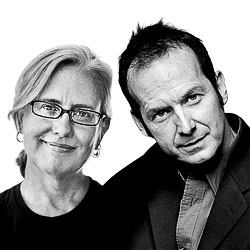“Nothing!” Denis O’Hare recalls saying a few years ago when Court Theatre’s artistic director, Charles Newell, asked what he and Lisa Peterson planned to write next. “We’re not writers—she’s a director, I’m an actor. This was a one-off.”
Granted, the “one-off” in question, An Iliad, was an especially conspicuous outing for a couple of novice playwrights with day jobs: Peterson is an in-demand theater director; O’Hare is an actor with recurring roles on American Horror Story (FX) and The Good Wife (CBS). A huge hit, their one-man adaptation of the Homeric epic sold out two runs in Chicago, the last in 2013—breaking all records for ticket sales at Court Theatre.
Newell persisted—if they wrote another play, what might it be?—and finally O’Hare floated an idea based on a long-standing interest: What if they did a play about the Bible? Newell signed on, and this spring Peterson directs the world premiere of The Good Book, the story of the Bible. More accurately, a story of the Bible, or perhaps some stories about the Bible—but not, decisively, stories from the Bible.

Peterson calls The Good Book’s structure a “three-part braided strand of stories” beginning in 3000 BC and extending nearly to the present. The play explores how the Old and New Testaments came into existence and how the fingerprints left on the Bible throughout its history—left by fallible, complicated beings propelled by all sorts of ambiguous motivations—affect how it’s read and interpreted today. Margaret Mitchell, the dean of the University of Chicago Divinity School, who advised the project, puts it this way: “The Bible is a character in the play, and the Bible grows up during the play.”
The thickest thread takes place in what’s called the writing room, where the text of the Bible is created. Another thread concerns Miriam (Jeff Award winner Hollis Resnik), a biblical scholar, and a third tells the tale of Connor (Alex Weisman, who recently starred in TimeLine’s My Name Is Asher Lev), a Midwesterner growing up Catholic in the 1970s.
Not incidentally, Connor’s story tracks closely with that of O’Hare, who, until he was 17, thought he’d be a priest. “I was religious enough that my parents were worried about me,” he says. He grew away from the idea and now describes himself as a “very comfortable, happy confirmed atheist.” But O’Hare has maintained an intimacy with scripture that comes in part from being gay and absorbing faith-based attacks on his sexuality. About six years ago, he created pamphlets to give out on the streets of New York. “Whenever anybody handed me a pamphlet about anything religious,” he recalls, “I handed them one of my pamphlets back. And my pamphlet was, ‘Did you know that there are only seven verses in the entire Bible that referred to homosexuality? Did you know that Jesus never said anything about homosexuality?’ ”
This desire to really grapple with the text—which Peterson calls “Denis’s obsession with the Bible”—is at the root of The Good Book. O’Hare says that in his Bible at home, he’s scrawled his “fury” in the margins: “ ‘What the fuuuuuck.’ ‘What an asshole.’ ‘Yahweh sucks!’ ‘What are these people doing?’ ”
In conversation, O’Hare speaks in long, complicated sentences. (He’s prone to passionate exegeses on biblical scholarship.) Peterson acts as a kind of editor, adding or probing or clarifying. The fluidity of their exchange resembles how they write: Working on An Iliad, the pair developed a style that involved recording and transcribing their extemporaneous conversations and then mining them for ideas or lines. For a scene in The Good Book involving a long-distance relationship, they improvised on Skype. “We’ll find that we just have some of the best, weirdest, kookiest choices come out that way, because you don’t think,” says Peterson.
They’ve formalized their writing partnership with a name that’s a nod to their shared interest in foundational literature: Homer’s Coat. There are plans for a third play, a quasi companion piece to An Iliad set in ancient Rome, but work on it has yet to begin. At last check, they were still completing the deeply immersive research they began when they started the Good Book project, including reading the entire Bible—together and out loud. Every chapter, every word. No skipping.
GO The Good Book runs March 19 to April 19 at Court Theatre. $35–$65. courttheatre.org



